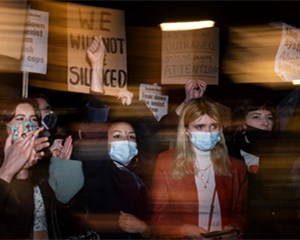But for those at the top of the social pecking order, narcissism mutates, not into loss, not into something you have at least partly to relinquish, but into an accursed gift, one that too easily leads to violence. No human, however powerful, is spared confrontation with the limits of their own power, with those realms, in the words of Hannah Arendt, "in which man cannot change and cannot act and in which, therefore, he has a distinct tendency to destroy".
但对于那些处于社会等级顶端的人来说,自恋会变异,不是变成失去,也不是变成你至少有一部分可以放弃的东西,而是变成一种受诅咒的礼物,一种太容易导致暴力的礼物。无论多么强大的人类,都无法避免与自身力量的局限发生冲突,用汉娜·阿伦特的话来说,“在这些领域中,人类无法改变,无法行动,因此,他有明显的毁灭倾向”。
Arendt was writing in the 50s about the forms of murderous totalitarianism that had spread over the Earth, but her prescient words are no less relevant now, when dictatorships are on the rise, we face the destruction of the planet, black men are being shot on the streets of the US, and the rates of death from austerity, rampant inequality and impoverishment are increasing by the day. When the pandemic started to break across the globe at the end of 2019, it soon became clear that one of its most striking features would be the way it accentuates the racial and economic fault lines of the world – from the fact that black, Asian and minority ethnic citizens in the UK are four times more likely than white people to die of Covid-19, to the killing of George Floyd which, mid-pandemic, repeated and underscored a historic context of violence. Nor did it seem to occur to any of the (mainly) men in power that the mantra to stay home and save lives in fact threatened the lives of women subject to domestic violence who were now trapped inside their homes; under lockdown the rate of such violence has soared.
阿伦特在50年代写的是遍布地球的各种形式的残忍的极权主义,但她那有先见之明的话在现在也同样适用,当独裁统治抬头时,我们面临着地球的毁灭,黑人在美国街头被枪杀,财政紧缩、严重的不平等和贫困造成的死亡率与日俱增。2019年底,疫情开始在全球蔓延,人们很快意识到,它最显著的特征之一就是它突出了世界上的种族和经济断层线——从英国的黑人、亚洲人和少数族裔公民死于新冠的可能性是白人的四倍,到新冠期间乔治·弗洛伊德的死,这些事实重复和强调了暴力的历史背景。那些掌权的(主要是)男性似乎也都没有想到,待在家里拯救生命的咒语实际上威胁到了那些现在被困在家里遭受家庭暴力的女性的生命,在封锁状态下,此类暴力事件激增。

Who decides what is called out as violence? Who determines the forms of violence we are allowed, and permit ourselves, to see? Not naming violence – its often undercover path of destruction, its random disposal of the bodies it needs and does not need – is one of the ways that capitalism has always preserved and perpetuated itself.
所谓的“暴力”是谁来决定的?我们被允许并且允许自己看到的暴力形式又是谁来决定的?不点名暴力——暴力往往是隐蔽的毁灭之路,它随意地处置自己需要和不需要的尸体——是资本主义一直保存和延续自己的方式之一。
In one of her sharpest insights and most trenchant ripostes, socialist revolutionary Rosa Luxemburg cautioned against the charge that the 1905 Russian Revolution had spilt blood by pointing out that the level of suffering was nothing compared with the indiscriminate, mostly unremarked, cutting down of lives by the brute machinery of capital that had flourished up to then. "Abroad the picture created of the Russian Revolution is that of an enormous blood-bath, with all the unspeakable suffering of the people without a single ray of light," she stated at a rally in Mannheim in 1906. "The suffering during the revolution is a mere nothing compared to what the Russian people had to put up with before the revolution under so-called quiet conditions."
社会主义革命家罗莎·卢森堡在她最敏锐的洞察力和最尖锐的反驳中,告诫人们不要指责1905年的俄国革命造成了流血,她指出,与当时繁荣的资本机器不分青红皂白地滥杀无辜相比,这种痛苦的程度简直微不足道。1906年,她在曼海姆的一次集会上说:“在国外,俄国革命被描绘成一场巨大的大屠杀,人们在没有一丝光亮的情况下承受着难以言喻的痛苦。”“与俄罗斯人民在革命前所谓的平静条件下所忍受的苦难相比,革命期间的苦难简直不值一提。”












